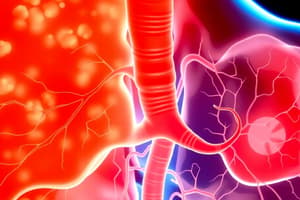Podcast
Questions and Answers
What are some nonspecific symptoms experienced by patients with pituitary conditions?
What are some nonspecific symptoms experienced by patients with pituitary conditions?
- Rash and itching
- Joint pain and fever
- Nausea and vomiting
- Memory and cognitive impacts (correct)
What emotional burden can patients with pituitary conditions struggle with?
What emotional burden can patients with pituitary conditions struggle with?
- Fear of spiders
- Burden of treatment (correct)
- Fear of public speaking
- Fear of heights
How can acromegaly impact a patient's appearance?
How can acromegaly impact a patient's appearance?
- It causes hair loss
- It changes appearance considerably (correct)
- It causes skin discoloration
- It leads to excessive sweating
What can become an issue if thyroid replacement is not quite right for patients with pituitary conditions?
What can become an issue if thyroid replacement is not quite right for patients with pituitary conditions?
What can have an economic impact on individuals with pituitary conditions?
What can have an economic impact on individuals with pituitary conditions?
What is a learning outcome related to anterior pituitary disorders such as acromegaly?
What is a learning outcome related to anterior pituitary disorders such as acromegaly?
What is the focus of the study mentioned in the text?
What is the focus of the study mentioned in the text?
What can patients worry about if they miss a dose of hydrocortisone by mistake?
What can patients worry about if they miss a dose of hydrocortisone by mistake?
What can be complex for patients with pituitary conditions in terms of returning to employment?
What can be complex for patients with pituitary conditions in terms of returning to employment?
What can affect relationships for individuals with pituitary conditions?
What can affect relationships for individuals with pituitary conditions?
What are the consequences of a pituitary tumour?
What are the consequences of a pituitary tumour?
How do we tackle a Pituitary Problem?
How do we tackle a Pituitary Problem?
What are the learning outcomes related to anterior pituitary disorders?
What are the learning outcomes related to anterior pituitary disorders?
Who is involved in the Pituitary MDT?
Who is involved in the Pituitary MDT?
What is a feature of acromegaly?
What is a feature of acromegaly?
How can hypopituitarism be managed?
How can hypopituitarism be managed?
What does a pituitary tumour pressing on adjacent structures lead to?
What does a pituitary tumour pressing on adjacent structures lead to?
Who is involved in the management of a pituitary problem?
Who is involved in the management of a pituitary problem?
What are the treatment options for acromegaly?
What are the treatment options for acromegaly?
What is the role of the neuro-radiologist in tackling a Pituitary Problem?
What is the role of the neuro-radiologist in tackling a Pituitary Problem?
What is a common clinical manifestation of acromegaly?
What is a common clinical manifestation of acromegaly?
How can the diagnosis of acromegaly be confirmed?
How can the diagnosis of acromegaly be confirmed?
What is a potential complication of pituitary tumors or their treatment?
What is a potential complication of pituitary tumors or their treatment?
What is the recommended management for acromegaly?
What is the recommended management for acromegaly?
What is a potential consequence of pituitary tumor compression of the optic chiasm?
What is a potential consequence of pituitary tumor compression of the optic chiasm?
What is a key indicator for the psychological impacts of pituitary disorders?
What is a key indicator for the psychological impacts of pituitary disorders?
What is a potential treatment for high IGF1 levels post-radiotherapy in acromegaly?
What is a potential treatment for high IGF1 levels post-radiotherapy in acromegaly?
What is a potential follow-up component for a patient post-trans-sphenoidal hypophysectomy?
What is a potential follow-up component for a patient post-trans-sphenoidal hypophysectomy?
What is a potential consequence of pituitary tumor affecting vision?
What is a potential consequence of pituitary tumor affecting vision?
What is a potential cause of hormone deficiencies in a patient with pituitary tumor?
What is a potential cause of hormone deficiencies in a patient with pituitary tumor?
Flashcards are hidden until you start studying
Study Notes
Pituitary Tumors and Acromegaly Management
- Pituitary tumors can compress the optic chiasm, causing bitemporal hemianopia, and should prompt visual field assessment.
- Hormone deficiencies can occur as a complication of pituitary tumors or their treatment, necessitating thorough hormone checks and screening for cranial diabetes insipidus.
- Acromegaly, caused by excess growth hormone, manifests in various clinical features affecting multiple systems.
- Growth hormone levels fluctuate, and the diagnosis of acromegaly can be confirmed through elevated insulin-like growth factor (IGF-1) and an oral glucose tolerance test (OGTT) with growth hormone suppression.
- Management of acromegaly may involve surgery, medications (such as dopamine agonists or somatostatin analogues), or radiotherapy.
- Psychological impacts of pituitary disorders are significant and should be addressed in patient care.
- A 40-year-old woman with visual disturbance and progressive symptoms was diagnosed with a pituitary tumor affecting her vision, leading to a decision for trans-sphenoidal hypophysectomy.
- Following surgery, the patient experienced hormone deficiencies and required replacement therapy for thyroid, adrenal, and gonadal hormones, as well as growth hormone.
- An annual clinic visit with medical discussion, biochemical testing, and specialist nurse consultation was part of the patient's post-op follow-up.
- A 63-year-old patient presented with shortness of breath and ankle swelling, leading to a diagnosis of heart failure with an ejection fraction of 27%.
- The patient was diagnosed with acromegaly, and treatment involved surgery followed by radiotherapy after no safe target was identified for further surgery.
- The patient's high IGF1 levels post-radiotherapy were successfully managed with Octreotide LAR, a somatostatin analogue, leading to normalization of IGF1 levels.
Studying That Suits You
Use AI to generate personalized quizzes and flashcards to suit your learning preferences.



